

Militia (United States) The term militia in the United States has been defined and modified by Congress several times throughout U.S. history.

As a result, the meaning of "the militia" is complex and has transformed over time.[1] It has historically been used to describe all able-bodied men who are not members of the Army or Navy (Uniformed Services). From the U.S. Constitution, Article II (The Executive branch), Sec. 2, Clause 1: "The President shall be the Commander in Chief of the Army and Navy of the United States, and of the Militia of the several States when called into the actual service of the United States. " Today, the term militia is used to describe a number of groups within the United States.
Primarily, these are: From Old English milite meaning soldiers (plural), militisc meaning military and also classical Latin milit-, miles meaning soldier. The early colonists of America considered the militia an important social institution, necessary to provide defense and public safety. [5] Shays' Rebellion. Mormon/LDS Survival. Our best survival tool is our own head.
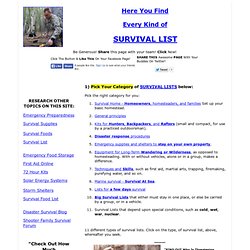
More is optional. There are 3 considerations, for making fire -- matches or source of flame, tinder, and knowhow. Havin a kit is a beginnin, but bein able to use the kit takes practice aforehand. In Mine. This is a basic kit. I like to use the Military Survical Manual as a reference. A great reference is FM 21-76. Good first aid kits that are light and complete for the non-medical person are Adventure Medical Kits -- google them -- many variations to fit your needs. #1...always...some way of making fire. . . . . . #2. How to Become a Survivalist.
History The origins of the survivalist movement in the United States and Britain may have been triggered by the Great Depression in 1929 and expanded during the Cold War when the civil defense programs were instituted.
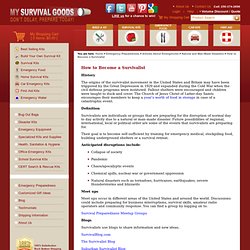
Fallout shelters were encouraged and children were taught to duck and cover. The Church of Jesus Christ of Latter-day Saints encourages their members to keep a year’s worth of food in storage in case of a catastrophic event. Definition Survivalists are individuals or groups that are preparing for the disruption of normal day to day activity due to a natural or man-made disaster. Their goal is to become self-sufficient by training for emergency medical, stockpiling food, building underground shelters or a survival retreat. Anticipated disruptions include: Collapse of societyPandemicChaos/apocalyptic eventsChemical spills, nuclear war or government oppressionNatural disasters such as tornadoes, hurricanes, earthquakes, severe thunderstorms and blizzards Meet ups.
The difference between a “Prepper” and a “Survivalist” There are several more detailed accounts ( of varying levels of wing-nut-ery ) of the etymologies of both of these labels than what I am putting down here; this post just describes in general terms what I feel the differences in connotation the two terms bring.
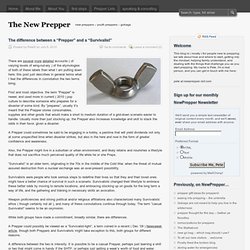
First and most objective, the term “Prepper” is newer, and used more in current ( 2010 ) pop culture to describe someone who prepares for a disaster of some kind. By “prepares”, usually it’s meant that the Prepper stores consumables, supplies and other goods that would make a short to medium duration of a grid-down scenario easier to handle.
Usually more than just stocking up, the Prepper also increases knowledge and skill to stack the odds in their favor, given a disaster. Survivalists. The current economic crisis has spawned a whole new breed of survivalists.
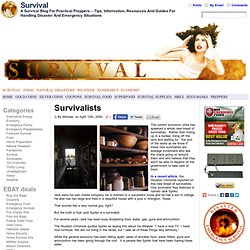
Rather than holing up in a bunker, living off the land and waiting for “the end of the world as we know it” these new survivalists are average Americans who see the chaos going on around them and who believe that they won't be able to depend on the government to take care of them. In a recent article, the Houston Chronicle reported on this new breed of survivalists. One survivalist they featured is named Jack Spirko. Jack owns his own media company, he is married to a successful nurse and he has a son in college. He also has two dogs and lives in a beautiful house with a pool in Arlington, Texas. Rise of the Preppers: America's New Survivalists - Newsweek and The Daily Beast. Lisa Bedford is what you'd imagine of a stereotypical soccer mom.
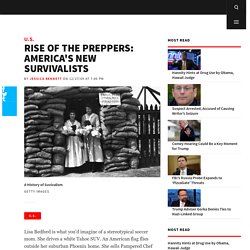
She drives a white Tahoe SUV. An American flag flies outside her suburban Phoenix home. She sells Pampered Chef kitchen tools and likes to bake. Bedford and her husband have two young children, four dogs, and go to church on Sunday. But about a year ago, Bedford's homemaking skills went into overdrive. In the past, survivalists and conspiracy theorists might go out into the woods, live out of a bunker, waiting (or sometimes hoping) for the apocalypse to hit.
That reaction, of course, means different things to different people. Researchers say that interest in survivalism can often be a barometer of social anxiety; and in many cases, says sociologist Richard Mitchell, it can be a response to modern stress. While there's no scientific data to track survivalism's recent growth, some preppers have speculated it's reached a level not matched in decades. Government has always played an active role in emergency preparedness. Observe. Prepare. Survive. - Chaos Preppers. Prepper Website - Preparedness, Survival & Alternative News. Practical Preppers - Survival Consultation. American Preppers Network. Prepper.org. Kibbutz. A kibbutz (Hebrew: קִבּוּץ / קיבוץ, lit.

"gathering, clustering"; plural kibbutzim) is a collective community in Israel that was traditionally based on agriculture. The first kibbutz, established in 1909, was Degania.[1] Today, farming has been partly supplanted by other economic branches, including industrial plants and high-tech enterprises.[2] Kibbutzim began as utopian communities, a combination of socialism and Zionism. Survivalism/Preppers. Use of the term survivalist dates from 1976.[1] The terms prepper and prep are derived from the word prepare, and have grown in popularity since the 1990s, partly as a reaction to terrorists like Ted Kaczynski and Timothy McVeigh and stereotypes connected with them.[2] History[edit] 1930s to 1950s[edit] The origins of the modern Survivalist movement in the United Kingdom and the United States include government policies, threats of nuclear warfare, religious beliefs, and writers who warned of social or economic collapse in both non-fiction and apocalyptic and post-apocalyptic fiction.

[citation needed] The Cold War era civil defense programs promoted public atomic bomb shelters, personal fallout shelters, and training for children, such as the Duck and Cover films. The Great Depression that followed the Wall Street Crash of 1929 is cited by survivalists as an example of the need to be prepared.[4][5] 1960s[edit] 1970s[edit] American Preppers Network - National Family Preparedness and Self-Reliance Organization.